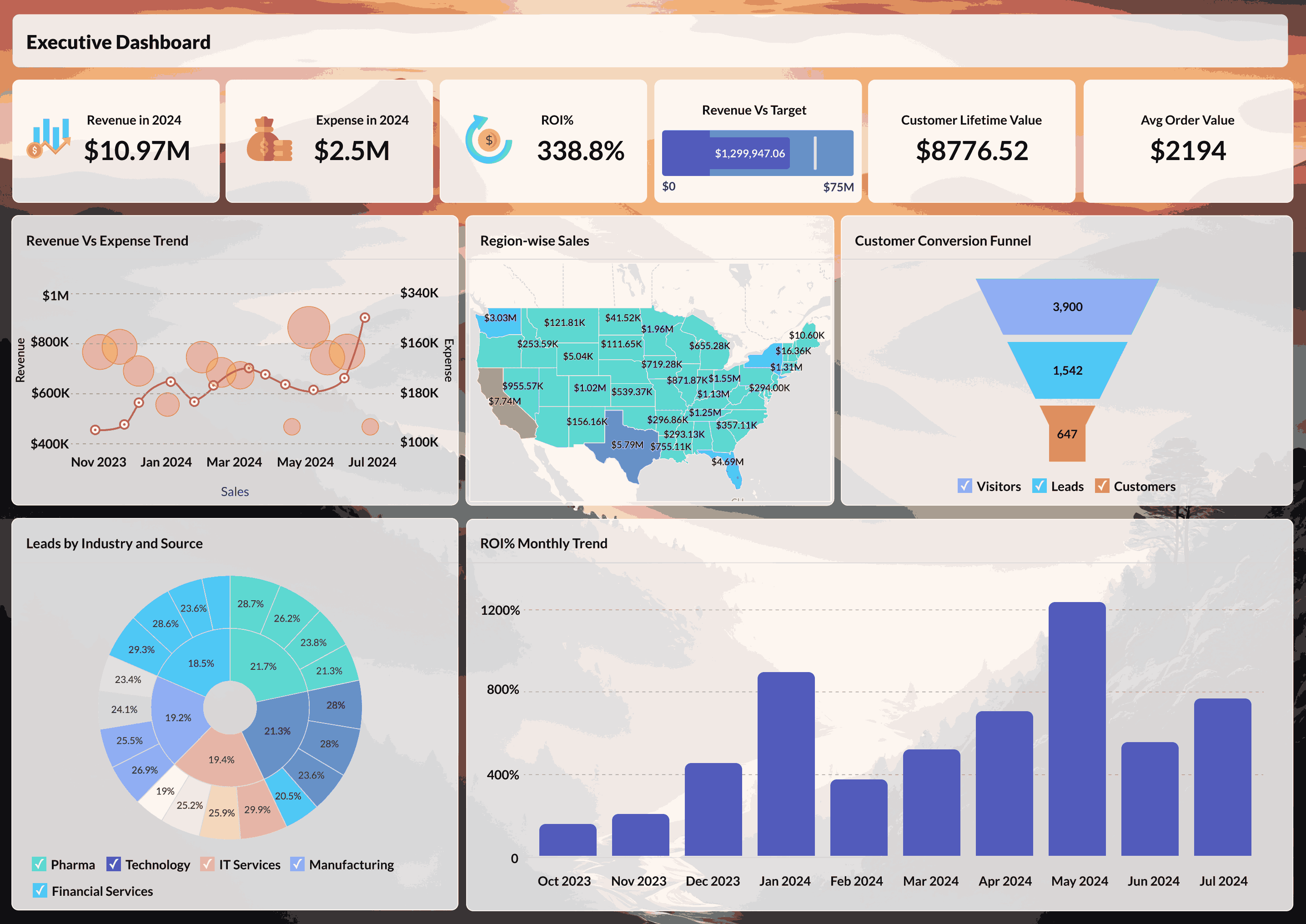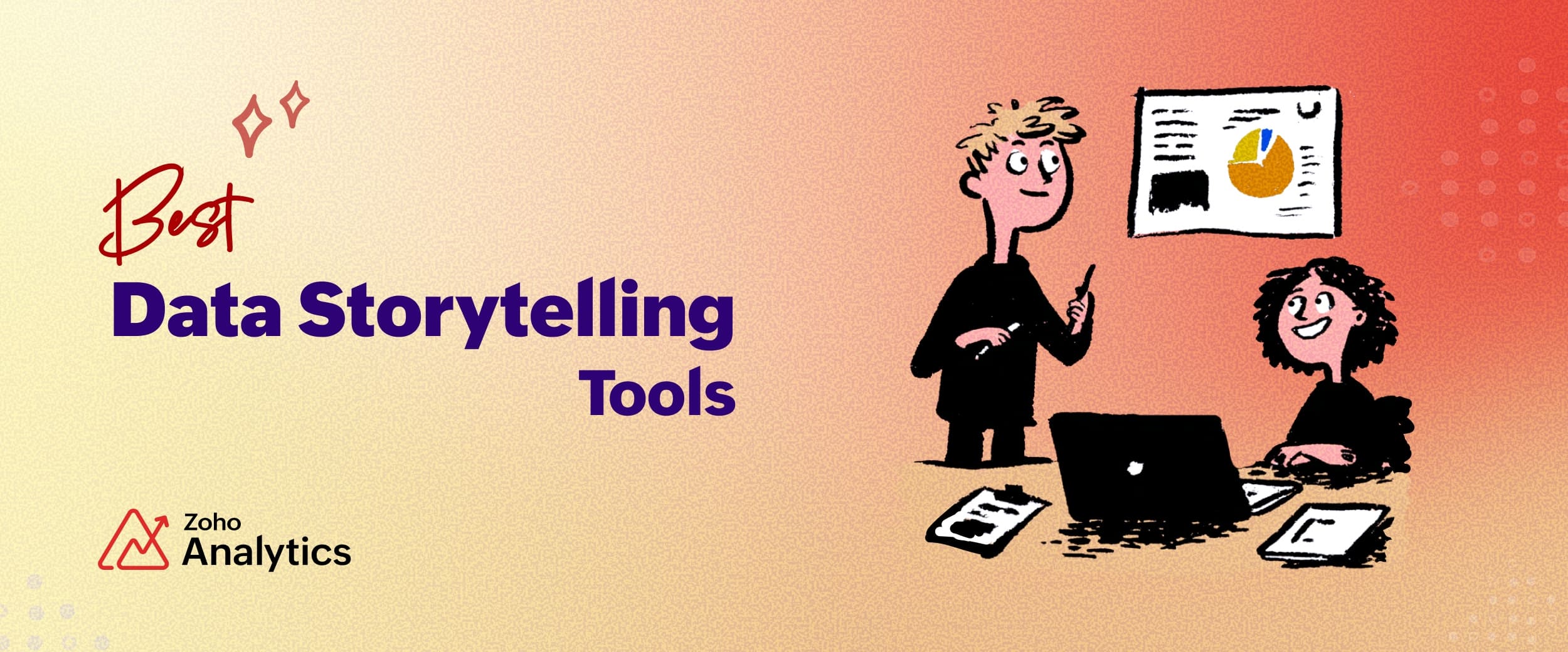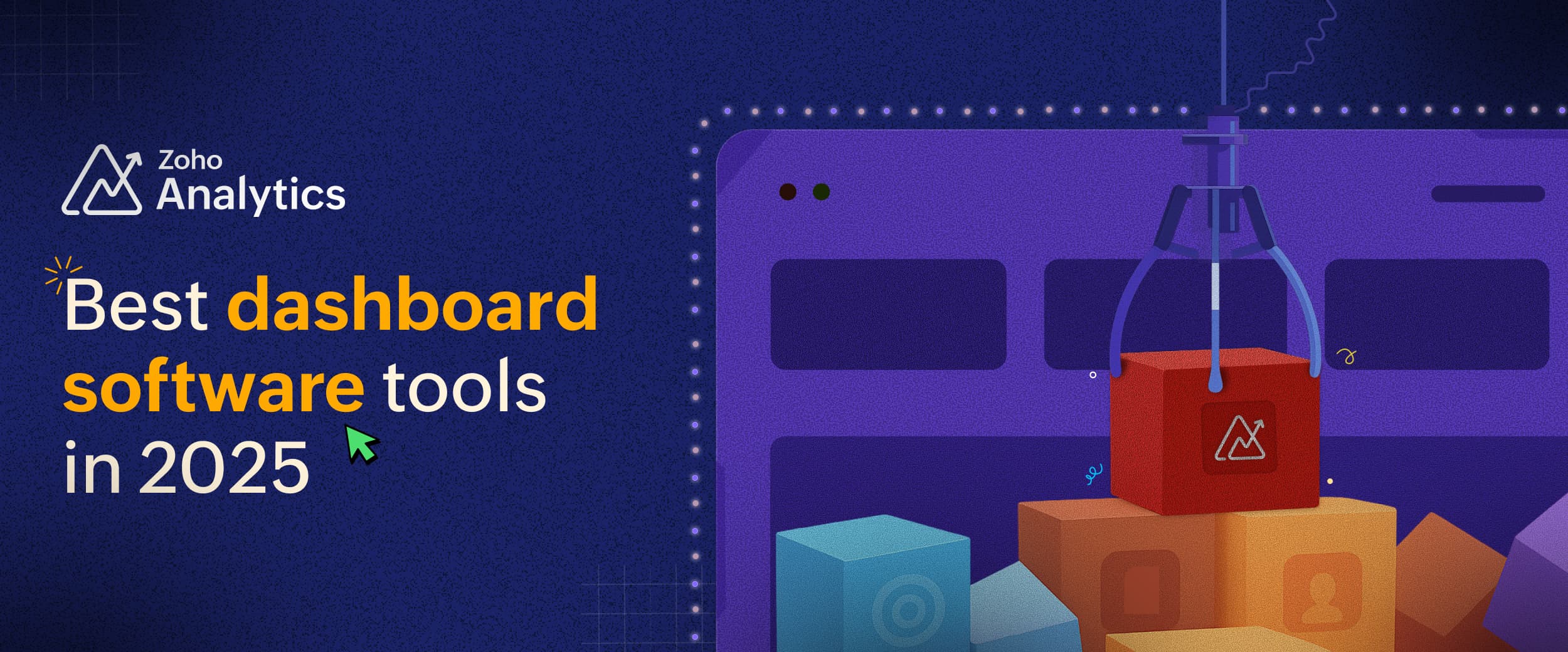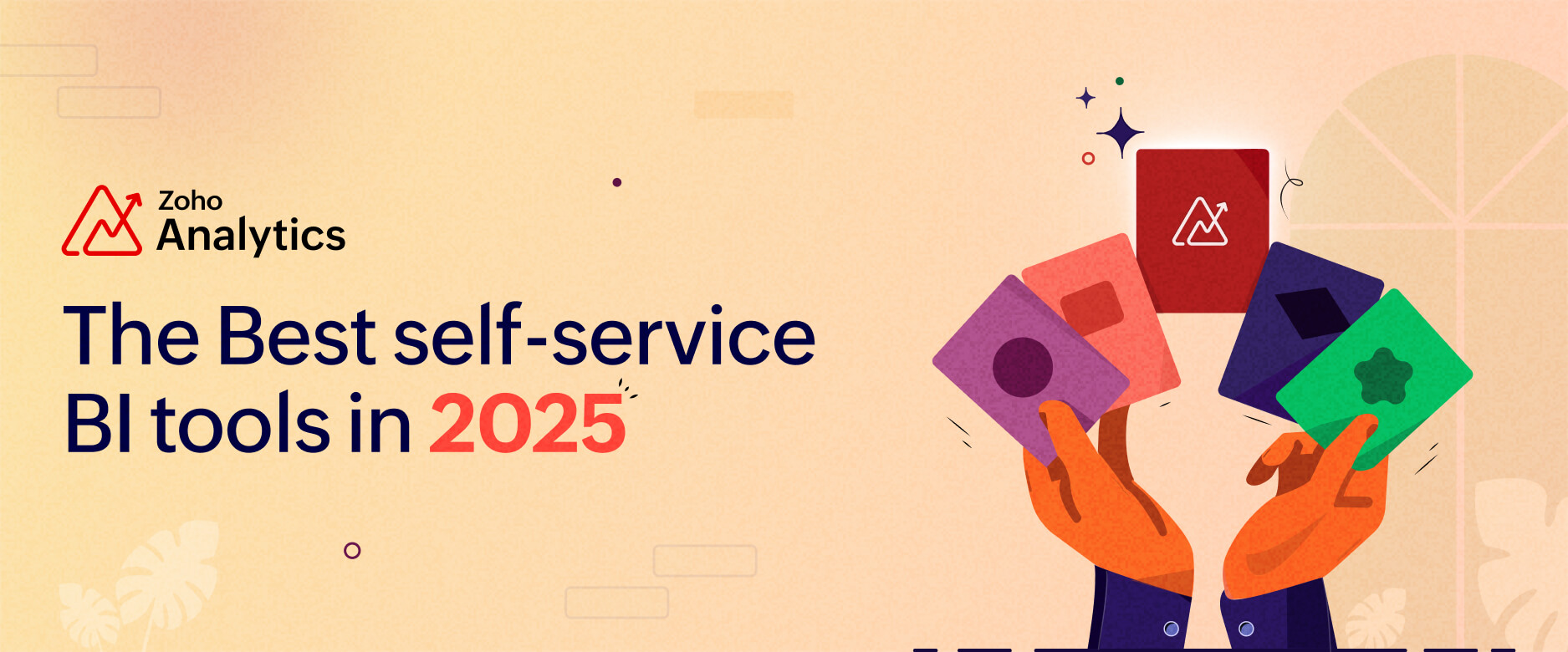- HOME
- BI & Analytics
- Top 5 Tableau alternatives in 2025
Top 5 Tableau alternatives in 2025
- Last Updated : July 16, 2025
- 1.3K Views
- 8 Min Read
Businesses that leverage the right business intelligence (BI) tools gain a competitive advantage. Recent studies revealed that business leaders say analytics has improved their organizations' operational efficiency within the first year.
For many, Tableau has been the go-to BI solution. It's recognized for its powerful capabilities.Tableau is a business intelligence software that helps users analyse and visualise data. The Tableau platform's Tableau Server and Tableau Online products enable users to share insights among teams. Also, Tableau has its own security measures while respecting your existing security protocols. But its high cost and complexity often lead businesses to seek out the best alternatives. And, Tableau can also be overwhelming for users looking for quick and actionable insights.
Why you should look for Tableau alternatives?
As the need for data visualization and business intelligence (BI) solutions increases, more businesses are reconsidering their reliance on Tableau and looking for alternatives. Tableau's complexity often requires additional training, which hinders the adoption across teams. Challenges like this prompt companies to consider more accessible and budget-friendly alternatives, which provide user-friendly data visualization dashboards, seamless integrations, and flexible pricing plans, helping businesses of all sizes. This shift indicates an increasing need for BI solutions that prioritize both ease of use and cost-effectiveness.
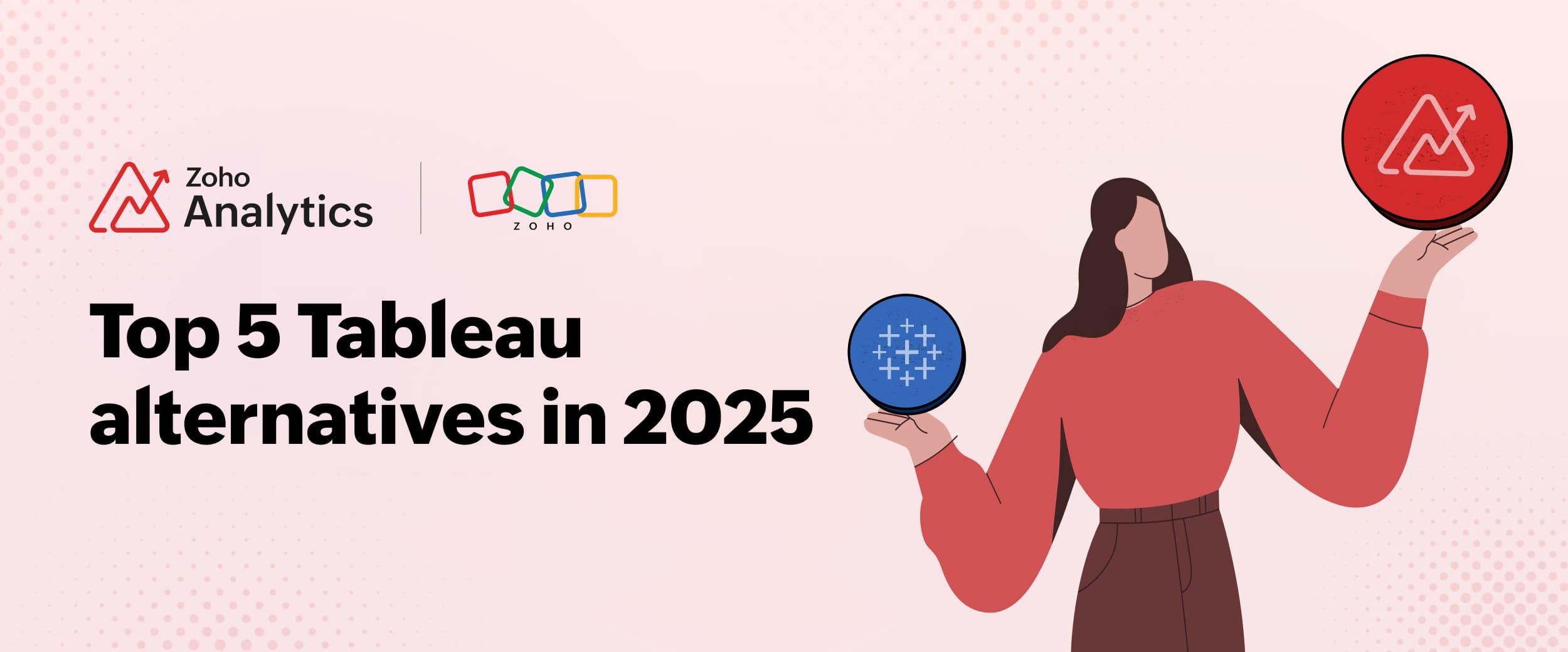
Key features to look for in Tableau alternatives
Ease of use
A modern BI tool should empower every user from both technical and non-technical background
Where Tableau falls short
Tableau often requires technical expertise to create and maintain dashboards. Its complex interface can be a barrier for non-technical users, making it less accessible for everyday decision making.
Data preparation
Preparing data shouldn't be a separate process - it should be a seamless part of your BI workflow.
Where Tableau falls short
Tableau's built-in data prep features are limited. Users have to switch to Tableau Prep, a separate tool, which comes with its own learning curve and licensing cost.
Transparent and straightforward pricing
Your BI solution should scale effortlessly with your business - without breaking the bank
Where Tableau falls short
Tableau's pricing model is complex and costly, especially as your team grows. Cost adds up quickly with separate charges for Tableay Prep, Creator, and Viewer licenses, making it hard to scale effortlessly.
AI-powered insights
In today's BI landscape, AI isn't optional - it is essential for faster, smarter decisions.
Where Tableau falls short
Although Tableau has introduced AI features, its advanced features are often tied to Salesforce's Einstein platform. This adds both complexity and cost,making AI-powered analysis harder to achieve.
Seamless collaboration and sharing
Turning insights into action requires smooth, real-time collaboration.
Where Tableau falls short
While Tableau allows dashboard sharing, it falls short on real-time collaboration. Features like in-context commenting and detailed permission controls are making it harder to align with everyday business workflows.
5 Tableau alternatives that provide better value for your investment:
In a world where data is transforming industries and driving innovation, having a reliable business intelligence solution is critical for staying competitive. Whether you're looking for enhanced scalability, AI-powered insights, or better cost efficiency, these five Tableau competitors can help you unlock value and enable smarter, data-driven decisions across your organization.
1. Zoho Analytics
A powerful yet easy-to-use business intelligence platform that excels in empowering users to make data-driven decisions. It supports 500+ data connectors, making integration a seamless process. What makes Zoho Analytics unique is its AI assistant, Zia. It enables users to query data in natural language, get automated insights, and perform predictive analytics effortlessly.
Best for: Affordability, AI-driven analytics for all business sizes
Key features
Ease-of-use
A user friendly BI platform with no steep learning curve and is accessible to users of both technical and non-technical background. The drag-and-drop interface, intuitive dashboard builder, and guided analytics make it easy for any users with no prior training or coding required.
Data integration
Connects with over 500 data sources and to a wide range of databases, data lakes, and data warehouses. Automate data syncs at custom intervals and use prebuilt connectors and more. This unified approach ensures you have all your data in one place - ready for analysis.
Data preparation
In-built data preparation tool that helps to model, cleanse, transform, enrich and catalog your data by applying 250+ transform function without any coding. Smart recommendations and rule-based worlflows make it easy to automate repetitive tasks,
Data visualization
A BI tool that offers more than 50 visualization options like charts, widgets, pivot, summary, and tabular views. With visual elements that are interactive, customizable, and embeddable, insights are communicated effectively. Zoho Analytics also supports conditional formatting and drill-downs for deep data exploration.
Gen AI
With Ask Zia, you can converse in natural language and gives you answers in both textual and visual format. Zia understands business terms and can auto-suggest questions, making it easier to explore data conversationally.
Predictive AI
Perform predictive analysis using uni-variate and multi-variate forcasting, what-if analysis, clustering, and even lets you set smart data alerts. You can also detect trends and anomalies. This allows you to make proactive business decisions with confidence.
DSML studio
Build custom ML models with the no-code assistant. Zoho Analytics supports various algorithms for regression, classifications, clustering, and more - all without a single line of code
Unified business insights
With unified business analytics in Zoho Analytics, you can bring in data across the organization for various functions. You can blend datasets from multiple departments and uncover cross-functional insights. This enables holistic decision-making with full context.
Collaborative analytics
Sharing and collaborative analytics made easy with fine-grain access control and publishing and embedding reports with or without logins. Users can comment on reports, schedule email exports, and collaborate within the platform. This fosters a culture of data-driven teamwork.
Data storytelling
Zoho Analytics lets you share captivating stories of your data with data storytelling through rich interactive reports. You can sequence your dashboards into narrative slide shows, making it easier to convey trends and insights during meetings.
Embedded analytics
Integrate a full-featured analytics platform within your application using single sign-on API or SAML authentication. Customize the embedded interface to match your app's look and feel, providing a seamless user experience.
Flexible deployments
Zoho Analytics offers both Cloud and on-premise deployment options based on your needs (both Cloud and on-premise) Also opt for hybrid deployments to manage certain data sources locally while using the cloud for reporting. This flexibility ensures you're never locked into a rigid environment.
Mobility
Zoho Analytics has a fully native mobile BI app that lets you access reports and dashboards on the move. You can drill into KPIs, share insights, and receive alerts in real time. This mobile app is optimized for both iOS and Android devices with responsive layouts.
Security
A BI platform that offers enterprise-grade security features, a governance framework, and clear demarcation on who can do what, based on roles like users, viewers, and administrators. Zoho Analytics is also compliant with major data protection standards like GDPR and SOC 2.
Zoho Analytics dashboard:
Why Zoho Analytics is better than Tableau
Zoho Analytics stands out from Tableau by delivering advanced features without Tableau's complexity or high costs, and is accessible to users of all technical levels. By combining advanced analytics features with an intuitive, and user-friendly interface, Zoho Analytics outshines Tableau. From its AI assistant Zia with natural language querying and predictive analysis to transparent pricing, Zoho Analytics empowers businesses of all sizes to unlock data-driven decisions effortlessly, making it a smarter, more cost-effective alternative to Tableau. Explore how Zoho Analytics compares with Tableau in detail.
2. Microsoft Power BI
Power BI is a feature-rich tools that offers deep integration with Microsoft Office and Azure. It is perfect for users familiar with Excel and other Microsoft tools. It enables a smooth transition and a unified workflow, allowing users to leverage their existing Microsoft ecosystem. Users can maximize their productivity and make data-driven decisions using the robust features offered by Power BI.
Best for: Organizations invested in the Microsoft ecosystem
Key features:
Real-time dashboards and data modeling.
Native integration with Microsoft Office 365 and Azure.
Strong scalability for businesses of all sizes.
Why Power BI is better than Tableau
Compared to Tableau, Power BI's real-time analytics and deep Microsoft integration make it a natural choice for organizations already using Microsoft products. Unlike Tableau, which operates as a stand-alone product with limited integration options, Power BI offers a unified experience and enhances workflows. Its scalability and adaptability provides a comprehensive solution that surpasses Tableau in both functionality and ecosystem compatibility. Explore how Zoho Analytics compares with Power BI in detail.
3. Domo
Domo is a cloud-first platform designed to improve teamwork efficiency and facilitate data-driven decision-making. Its simple interface is suitable for both technical and non-technical users, allowing all employees to access, analyze, and utilize data insights effectively. Also, Domo's standout features is its 1,000 pre-built data connectors, enabling businesses to easily integrate from various data sources.
Best for: Real-time data visualization and team collaboration
Key features:
Over 1,000 data connectors.
Customizable, real-time dashboards.
Collaboration tools for teams.
Why Domo is better than Tableau
What sets apart Domo from Tableau is its real-time collaboration and user-friendly functionality, making it an ideal solution for teams in need of quick and actionable insights. Teams can effortlessly share reports, dashboards, and visualizations across their organization, fostering a collaborative environment. Domo's interface simplifies data integration, visualization creation, and insight sharing. This combination of simplicity and real-time collaboration makes Domo a compelling options for organizations focused on making data-driven decisions. Explore how Zoho Analytics compares with Domo in detail.
4. Looker
Now a part of Google, Looker is a strong analytics platform designed for businesses needing tailored solutions and seamless integration with Google's ecosystem. By utilizing LookML, its unique modeling language, businesses can create custom data models and build precise dashboards to suit their unique needs. It deeply integrates with Google Cloud services like BigQuery and Workspace, enabling efficient data processing and collaboration.
Best for: Advanced data modeling and exploration
Key features:
LookML for custom data modeling.
Seamless integration with Google Cloud services.
Modern interface for data exploration.
Why Looker is better than Tableau
Looker's easy integration with Google Cloud services, like Big Query and Workspace, makes it a top choice for organizations using the Google ecosystem. Unlike Tableau, Looker offers better flexibility through its proprietary LookML for tailored data modeling, enabling businesses to create custom workflows. With a user-friendly interface, real-time analytics, and scalability, Looker provides a solution that is particularly invested in Google Cloud. Explore how Zoho Analytics compares with Looker in detail.
5. Sisense
Sisense differentiates itself from Tableau by embedding analytics into applications, allowing users to access insights easily within their daily workflows. Its innovative in-chip processing technology delivers exceptionally fast performance, even with larger datasets, making it ideal for real-time decision-making.
Best for: Embedded analytics and handling large datasets.
Key features:
Embedded analytics capabilities.
In-chip technology for faster processing.
Advanced customization options.
Why Sisense better than Tableau
Sisense outperforms Tableau by prioritizing embedded analytics and exceptional processing performance, making it a top choice for developers and technical teams. Unlike Tableau, which functions primarily as a stand-alone analytics tool, Sisense enables businesses to integrate analytics directly into their applications, portals, and workflows, ensuring insights are seamlessly delivered as analytics. This flexible embedded solution makes Sisense a compelling alternative to Tableau. Explore how Zoho Analytics compares with Sisense in detail.
Wrapping up: Zoho Analytics - The Best Alternative for Tableau
For 2025, Zoho Analytics wins as the best free data visualization alternative to Tableau with its robust, cost-efficient, and user-friendly solution for businesses of all sizes. From interactive user interfaces and seamless integrations to a cloud-first approach and AI-driven insights, Zoho Analytics emerges as the all-in-one BI solution.
Whether you are looking for easy-to-use features, advanced analytics, or effortless collaborations to fuel your data-driven decisions, Zoho Analytics has everything you need to make your business move ahead faster and smarter while keeping things simple and accessible. For organizations looking for an intuitive and effective BI tool, Zoho Analytics is the best BI solution and the top rated alternative to Tableau that lets you fully leverage your business's data without spending too much.
So why choose complexity when you can have simplicity, affordability, and accessibility with Zoho Analytics? Switch to Zoho Analytics by starting our 15-day free trial now. Got more questions? Get a personalized demo from us and let go of complexity today.
Choose easy. Choose Zoho Analytics.
 Vinisha
VinishaVinisha is a Marketing Analyst at Zoho Analytics with a strong passion for both marketing and data. She’s naturally curious about trends and loves diving into data to uncover what drives effective campaigns. She has a knack for simplifying complex information and presents insights in a relatable and engaging way that connects with audiences. Outside of work, she enjoys exploring the creative side of digital marketing.
